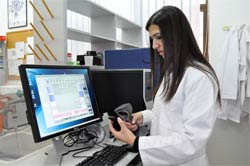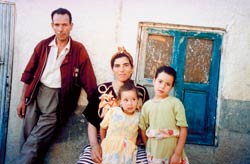Israeli-Palestinian genetic research project advanced by US donation
February 2010 | Volume 9, Issue 1
The bitter and protracted conflict between Israelis and Palestinians makes it difficult for any sort of meaningful collaboration to form between the two sides. After any outbreak of violence, it becomes almost impossible, psychologically and logistically, for them to work together. Against all odds, a research collaboration investigating inherited diseases is one area that holds promise.

Photo courtesy of Dr. Moien Kanaan
With a $1 million donation of genetic analysis
equipment, California-based Affymetrix greatly
advanced joint Israeli-Palestinian research efforts.
The fledgling effort is being nurtured by the Israeli-Palestinian Science Organization, a U.S. donation of advanced genetic analysis equipment encouraged by the State Department, and support from Fogarty and other NIH components.
Intermarriage is common among Arabs, with about a quarter of all unions occurring between first cousins, according to the Center for Arab Genomic Studies. That practice results in serious inherited diseases such as congenital heart defects and deafness. These medical problems put a particularly heavy burden on families, particularly those with low incomes, as well as the health care system.
But the revolution in the science of genetics offers hope. Identification of the mutations underlying a disease makes it possible to develop a number of new approaches: pre-marital screening could lead to marriage avoidance in couples found to be at risk, and prenatal diagnosis and newborn screening would make earlier interventions possible.
The Israeli-Palestinian Science Organization bridges the divide
"Our mission is to foster and sustain scientific cooperation between Israelis and Palestinians and to promote research partnerships that will improve the health of all people," according to Nobel laureate and IPSO chair, Dr. Torsten Wiesel. "We believe that science, given its universal character, can be instrumental in stimulating dialogue, openness, and mutual respect, and serve in the cause of peace."
IPSO, sponsored by UNESCO and created in 2003, seeks out and supports high quality scientific research and facilitates cooperation between Israelis and Palestinians to encourage scholarship and scientific excellence, capacity building and professional development, social and economic welfare, and dialogue across the divide. The organization funds diverse programs that run the gamut from agriculture, education and psychology to medical conditions, genetics research and counseling.
A $1 million gift of genetic analysis equipment from the California-based company, Affymetrix, will dramatically elevate the genetics research and counseling work IPSO supports. In December, two complete Affymetrix GeneChip® Systems were installed in the labs of university partners Bethlehem University on the West Bank and Hebrew University in Jerusalem. Research teams are now using the equipment for studies of recessive genes in Palestinian and Israeli-Arab populations.
In 2008, when IPSO was trying to launch its genetics research effort, it sought help from Dr. Elias Zerhouni, who was then NIH director. Zerhouni provided seed money in the form of a $50,000 Fogarty award to jumpstart the research. In addition, Dr. Nina Fedoroff, science and technology adviser to the U.S. Secretary of State and Penn State plant geneticist and molecular biologist, brought the project's needs to the attention of Dr. Stephen Fodor, the founder of Affymetrix, a pioneer in genetic analysis and the leading provider of innovative analysis and testing tools and agents. Fodor agreed to help and Fogarty's Middle East officer, Judy Levin, facilitated the formal arrangement and delivery logistics.

Photo by Lauren Goodsmith, courtesy of Photoshare
Intermarriage is prevalent among many Arab
populations, which results in a high rate of
inherited diseases.
Affymetrix responds to the need
"Affymetrix is very supportive of the scientific and educational mission of IPSO," said Fodor. "We hope this donation will help foster new Israeli-Palestinian scientific collaborations and create common ground for scientists to meet and discuss genetics research, counseling and applications in regional health care."
The Affymetrix donation takes the work of IPSO-supported genetics to another level. The equipment enables scientists to explore the genetic causes behind many diseases using state-of-the-art microarray technology that can test many samples simultaneously, greatly speeding up research.
"The scientific importance of the Affymetrix donation is in creating a unique resource for identifying new disease genes and illuminating gene functions," says Fogarty grantee Dr. Moien Kanaan, head of the Hereditary Research Laboratory at Bethlehem University. "The array technology provides tools for investigation, training, education and genetic services. For systematic clinical and genetic analysis of highly inbred populations, it is extremely valuable."
Genetics research effort expands
Beginning in 1999, Fogarty grants began collaborations that led to funding from the National Institute on Deafness and Other Communication Disorders for Kanaan, Dr. Karen Avraham of Tel Aviv University and Dr. Mary Claire King, their U.S. partner at the University of Washington. They launched a gene mapping and cloning project and discovered four genes associated with inherited deafness, which Palestinians suffer at more than double the rate of the average population.
A grant from IPSO expanded the collaborative genetic research to include Dr. Doron Lancet of the Weizmann Institute and, thanks to a Fogarty grant, Dr. Bat-Sheva Kerem of Hebrew University.
In addition, Kanaan and Avraham have began a joint graduate program for Palestinian students who have completed an undergraduate degree in science at Bethlehem University, where there is no post-graduate program, so they can pursue an advanced degree at Tel Aviv University.
Such efforts to share technology and to create international partnerships that produce scientific discoveries are vital to global prosperity and security, according to Fedoroff. "This important genetic research has the potential to improve many lives and decrease the burden of genetic disease. It's a perfect example of how science can improve health and at the same time stimulate dialogue and foster mutual understanding between peoples."
To view Adobe PDF files,
download current, free accessible plug-ins from Adobe's website.
Related World Regions / Countries